

Most ebook files are in PDF format, so you can easily read them using various software such as Foxit Reader or directly on the Google Chrome browser.
Some ebook files are released by publishers in other formats such as .awz, .mobi, .epub, .fb2, etc. You may need to install specific software to read these formats on mobile/PC, such as Calibre.
Please read the tutorial at this link: https://ebookbell.com/faq
We offer FREE conversion to the popular formats you request; however, this may take some time. Therefore, right after payment, please email us, and we will try to provide the service as quickly as possible.
For some exceptional file formats or broken links (if any), please refrain from opening any disputes. Instead, email us first, and we will try to assist within a maximum of 6 hours.
EbookBell Team

5.0
48 reviewsThis book offers a comprehensive empirical analysis of South African inflation dynamics, using a variety of techniques including counterfactual analysis. The authors elaborate the roles in inflation of thresholds, nonlinearities and asymmetries introduced by economic conditions such as the size of exchange rate changes and volatility, GDP growth, inflation, output gap, credit growth, sovereign spreads and fiscal policy, providing new policy evidence on the impact of these. Ndou and Gumata apply techniques to determine the prevalence of updating inflation expectations, and reconsider the propagation effects of a number of inflation risk factors. Asking to what extent the evidence points to a need to enforce price stability and the anchoring of inflation expectation, the book fills existing gaps in South African Policy, and maintains a clear argument that price stability is consistent with the 3 to 6 per cent inflation target range, and that threshold application should form an important aspect of policy analysis in periods of macroeconomic uncertainty. As such, the book serves as an excellent reference text for academic and policy discussions alike.